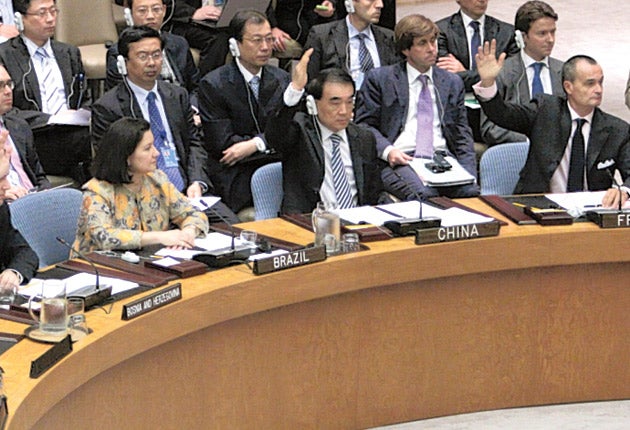Tehran defiant as UN approves new sanctions

The UN yesterday approved fresh sanctions against Iran targeting manufacturing firms, individuals, the elite military guard and shipping lines. While tougher early draft resolutions were diluted, notably by China, the vote opens the way for countries and trading blocs, including the US and the EU, to follow the additional measures.
Iran reacted angrily after 12 Security Council countries supported what is now the fourth round of sanctions against Tehran. Only Brazil and Turkey voted against with Lebanon abstaining.
US President Barack Obama, speaking at the White House, said the sanctions were an "unmistakable message" to Iran that the world would not tolerate its continued refusal to halt its uranium enrichment, which Washington believes is aimed at developing an atomic bomb. Early efforts by the US to target Iran's energy sector were resisted by China, which has a veto in the Council, but significant additions to the new sanctions regime were made and now become part of international law.
An arms embargo has been expanded to include eight new categories of weapons, including missile systems, tanks and aircraft. Iran will no longer be allowed to invest in uranium mining or missile production overseas.
China was adamant that any measures passed in New York should not hurt the day-to-day economy. They do, however, target the Islamic Revolutionary Guards (IRG), the military elite behind the anti-democracy crackdown.
Of the 40 companies now singled out for an overseas asset freeze – mostly manufacturing companies seen by the UN as fronts for the arms industry – 15 are owned or have close ties with the financial dealings of the IRG, officials said.
Among the blacklisted companies is Khatam al-Anbiya Construction, which has vast civilian and military contracts including for construction of the secret enrichment facility inside a mountain near the city of Qum. Only one bank was named in the resolution, the First East Export Bank, and while only one Iranian scientist is named for an asset freeze and travel ban, one such ban already imposed on 40 Iranian officials will be reinforced.
The main text urges countries to "exercise vigilance" in all dealings with Iran's Central Bank, accused of supporting terrorism and weapons proliferation. Countries are also urged to block the opening on their territories of branches of any Iranian banks suspected of helping the country's nuclear effort.
A broad ban on conducting business with Iran's largest shipping line, IRISL, did not survive following objections by China. But steps are to be taken against a number of other shipping firms with links to the line. The resolution also introduces a new cargo inspections regime under which countries will be expected to board and inspect Iran ships and Iran Air cargo planes suspecting of carrying freight that could be used to build nuclear arms.
Iran and its state-backed enterprises have become adept at skirting sanctions. After three earlier rounds, Tehran shows no sign of ending its defiance of the UN on nuclear development. Yet, US officials say the new measures will significantly curtail Iran's ability to conduct overseas business and, they hope, further develop any nuclear capacity.
They also say more pain will come. "These aren't crippling in themselves," one Western diplomat said. "But it's the opening shot for a whole number of other initiatives that are being pursued." The rhetoric of Iran remained characteristically defiant last night.
President Mahmoud Ahmadinejad said during a visit to Tajikistan: "These resolutions have no value... it is like a used handkerchief that should be thrown in the waste bin."
Join our commenting forum
Join thought-provoking conversations, follow other Independent readers and see their replies
Comments
Bookmark popover
Removed from bookmarks